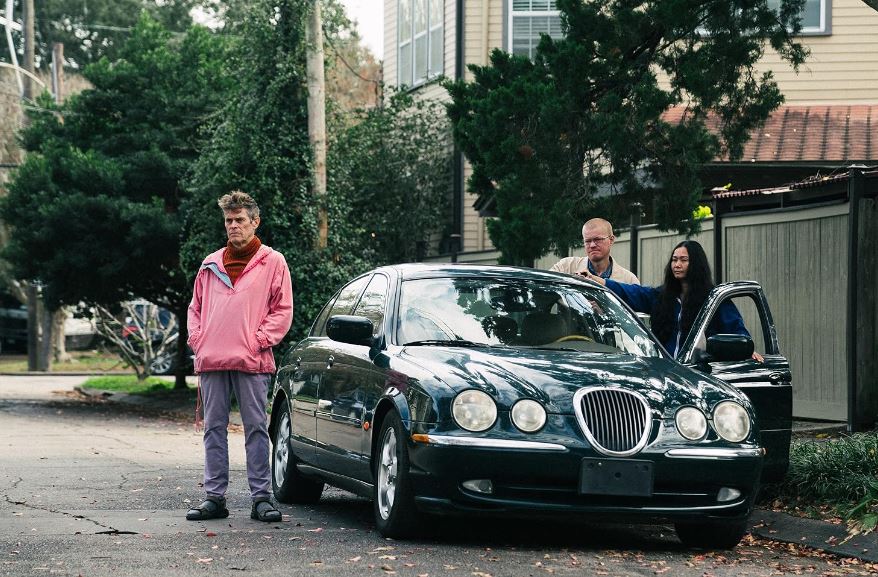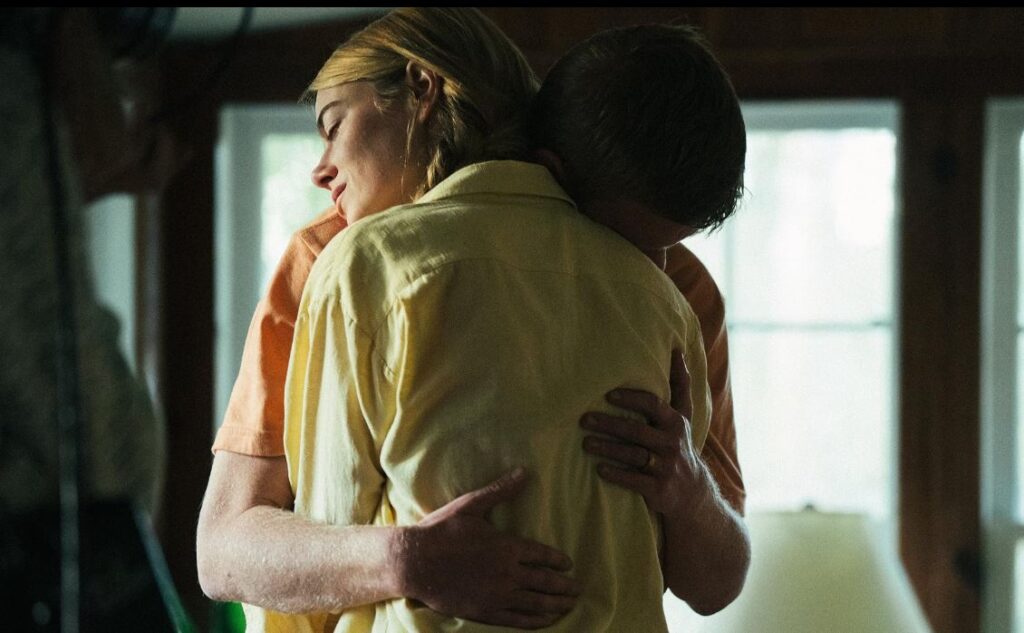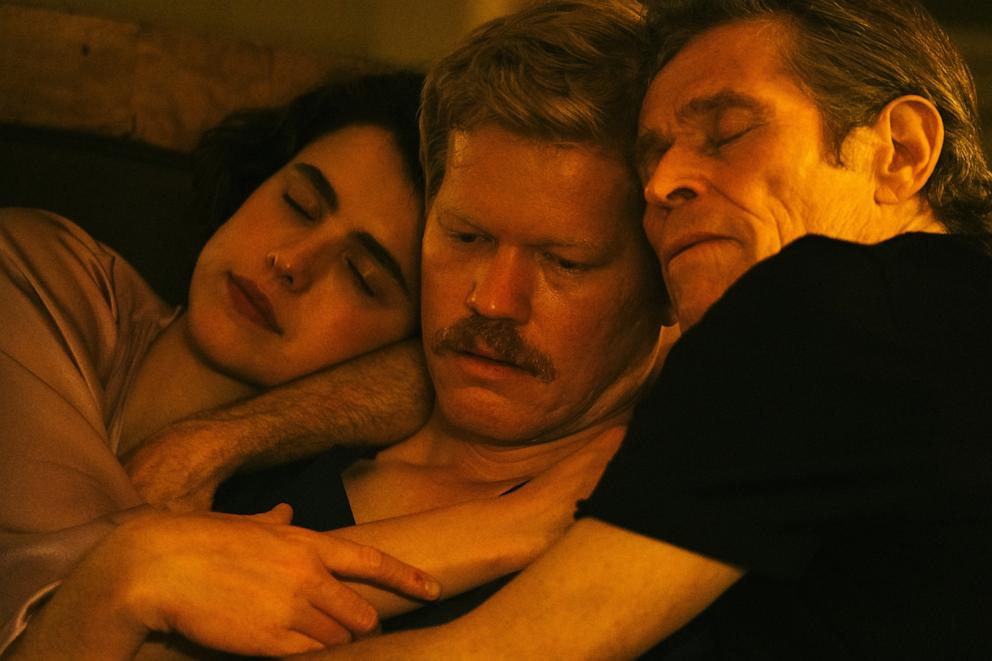
kind (n.) comes from the cognate word, kinned (Old English gecynd meaning “kind, nature, rate,” related to Old English cynn meaning “family”) and the Proto-Indo-European root gene- meaning “give birth, beget.” A familial and tribal group, a nation or brethren. Related to the word child (n.) [e.g. kindergarten]
kindness (n.) first used c. 1300, comes from Middle English kinde meaning “natural, native, or innate with the feeling of relatives for each other.” Used to denote “courtesy or noble deeds” performed out of a sense of kin or family, which is implied to be natural and innate.
The latest from Yorgos Lanthimos and Efthimis Filippou (co-writer on all of Lanthimos’s strangest and least crowd-pleasing movies—Dogtooth, Alps, The Lobster, and The Killing of a Sacred Deer—as well as Athina Rachel Tsangari’s brilliant satire Chevalier) is titled in a way that may seem ironic at first glance, until one delves into the origins of the word kindness. None of the various characters in the three short films that comprise this wildly original anthology behave in ways seen by normal society as “kind,” but the odd and often disturbing “noble deeds” they do are all rooted in a desire for “kindness,” defined as a sense of belonging to some sort of familial organization.

In the first story, The Death of R.M.F., we are introduced to a man (Yorgos Stefanakos) with those initials almost immediately; in fact, they are monogrammed onto his crisp, white shirt, about which some fuss is being made. However, we remain unsure for some time whether this is the doomed individual of the title because the other three principal characters—Robert (Jesse Plemons), Raymond (Willem Dafoe), and Rita (Emma Stone)—all share the same (at least) first initial. This is just one of many ways in which Lanthimos and company keep viewers on their toes and guessing throughout the movie. Robert is employed by Raymond, and lives his life according to Raymond’s strange and strict guidelines, right down to when he is meant to fuck his wife, Sarah (Hong Chau), and whether they are allowed to reproduce. It calls to mind the dominant-submissive relationship in Secretary, but Raymond’s intentions are far more sinister, as becomes clear when he commands Robert to kill R.M.F. with his car.
This is where Robert understandably draws the line, and he seems just as surprised as we are at how calmly Raymond reacts. He allows Robert to keep the house and car, the lavish lifestyle to which he has become accustomed, but without constant instructions and approval, Robert’s life quickly falls apart. When Sarah learns the extent to which Raymond has controlled her life through Robert, she leaves him, and soon Robert finds himself unable even to order a drink without Raymond telling him what to have. He is distraught until he meets Rita, another acolyte of Raymond’s who has failed at the same assigned task. Her interest in him is implausible, their conversation pointedly awkward in a manner similar to the famous train scene in The Manchurian Candidate, which leads one to wonder if Raymond has also orchestrated this meeting in order to guide Robert back to his particular kind of “kindness.”

The Death of R.M.F. introduces an important theme that echoes throughout Kinds of Kindness: the importance of sacrifice in order to belong. In the second segment, R.M.F. is Flying (as in the other two), it is various forms of human sacrifice we’re talking about, with death as the ultimate act of devotion. Plemons appears as a new character, Daniel, a police officer distraught over the disappearance at sea of his marine biologist wife, Liz (Stone). After she is rescued by helicopter pilot R.M.F., however, Daniel’s distress only increases, as he becomes convinced she is not the woman he married, but some kind of imposter or body snatcher. This new Liz enthusiastically eats chocolate while the one he knew disliked it, she is pregnant after previously being deemed barren, and her shoes no longer fit. She confides to her father (Dafoe) that she was marooned on an island on which dogs kept her and the other human survivors as pets, feeding them chocolate because the dogs themselves could not eat it (a closing credits montage of the dogs going about their human business is the absurdist comic highlight of the whole movie).
One thing that makes this story perhaps the most compelling of the three (subjective opinion after only a single viewing) is the question of whether Liz truly has been replaced by a doppelganger, or if Daniel has gone mad in her absence and is now physically and psychologically abusing her. I lean strongly toward the latter interpretation, though it is clearly ambiguous by design. Liz’s newfound appreciation of chocolate due to its consistent availability on the island over other types of food could be a metaphor for her relationship to Daniel. After her experience on the island, she has come to appreciate his consistency and shows a newfound devotion to him, becoming quite literally self-sacrificing at his behest. Daniel, in turn, finds himself distrusting and, ultimately, disgusted by her acts of devotion. Having claimed her as a prize that should have been out of his grasp, he no longer wants her, or even believes she is herself, when the balance of power in their relationship shifts to him; he wants the aloof, frequently absent woman he had become accustomed to adoring one-sidedly, a different kind of kindness than what she offers him now.

The third story, R.M.F. Eats a Sandwich, concerns a married couple, Emily and Andrew (once again played by Stone and Plemons), who follow cult leaders Omi and Aka (Dafoe and Chau). Their mission is to find a prophesied one with healing powers who can raise the dead. This potential savior must meet exact physical specifications and have a dead twin, and followers of Omi and Aka only drink water that has been infused with the tears of their leaders. They even refuse to eat fish for fear of the contamination from unpurified water, calling back to Stone’s lost-at-sea marine biologist and her dietary preferences in the second short, with the kind of maddening dream logic that permeates the entire movie.
The theme of sacrifice (particularly self-sacrifice) recurs as well, with the introduction of the twins Rebecca and Ruth (both played by Margaret Qualley, who also appears in the first two segments). Rebecca, who somehow knows the object of Emily and Andrew’s mission, believes Ruth to be the prophesied one. Ruth is a veterinarian, a healer of animals, and she has previously saved Rebecca from drowning in a swimming pool after a drunk diving accident. When Emily is found to be “contaminated” and excommunicated from the cult by Omi and Aka, she becomes desperate to fulfill the prophecy and return to their kindness, leading to a string of shocking, traumatic events capped by our hero, R.M.F. spilling ketchup all over his shirt—the same crisp, white shirt he was wearing upon his introduction.

R.M.F. really could be considered the hero of the whole movie, or as close to a hero as a deeply twisted and unconventional movie like this could have, anyway. He is the sacrifice that brings Robert back to Raymond in the first short, the helicopter pilot who rescues Liz and brings her back to Daniel in the second one, and it is his resurrection at the hands of Ruth in the third story that proves her powers and opens the way for Emily’s potential return to the kindness of Omi and Aka. He speaks no words and seems to have no agency of his own; he is the only character that remains the same in all three stories, and his final act onscreen is a comical accident that ruins his immaculately prepared plans.
Kinds of Kindness is certain not to please crowds or win Oscars like Poor Things or The Favourite, but it is prime Lanthimos, at his most confounding, compelling, and mischievous. The subtle, recurring details and motifs practically demand multiple viewings, but even if each story can never be “solved,” they are each fascinating in their own right, and even more so as part of this bizarre and endlessly intriguing triptych fable. It is, among other things, a twisted mirror held up to our own desperate need for a sense of belonging.
Leave a Reply